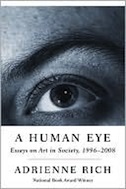 A Human Eye: Essays on Art in Society, 1997-2008
A Human Eye: Essays on Art in Society, 1997-2008
by Adrienne Rich
Norton. 180 pages, $15.95
THE ESSAYS in this collection cover a variety of subjects, from the difficulties of translating Iraqi poetry to a reflection on James Baldwin. Each topic, however, demonstrates Adrienne Rich’s remarkable intellect and critical faculty.
Rich is not afraid to take on the controversial subjects, as in “Jewish Days and Nights,” where she confronts the idea of “Jewish sameness,” the belief—popular within certain segments of American Jews—that all Jews feel the same way towards Israel and its policies, without considering class and cultural differences, or even the tradition of dissent found in Jewish literature. This orthodoxy, viewed by many as the official Jewish voice, considers the Holocaust an absolutely historically unique event, and supports Israel without question, assuming that whatever is best for Israel is best for the Jews. She finds this mindset moving its adherents away from “centuries of Jewish conversation about justice, ethics, human rights, property, and our obligations to others,” and contends that speaking against what one perceives as injustice, even if it involves Israeli actions, is not an act of betrayal. She addresses this complex, emotionally charged conversation with justice and intelligence.
In this same essay, Rich talks about how the diversity of her father’s library while she was growing up in Maryland taught her “that it’s possible and necessary to be interested in everything.” Indeed, her ability to write eloquently on topics ranging from three generations of gay and lesbian poets to the early work of Amiri Baraka testifies to the breadth of her reading and interests.
Her essay on Baraka’s book The Dead Lecturer, an early collection written when he was still known as LeRoi Jones, praises his poetry’s exploration of what it meant to be a black artist and an intellectual during the Civil Rights era, when blacks were rebelling against the white-dominated power structure. At the same time, though, Rich readily admits her displeasure with his use of the words “Jew” and “fag” to describe those he considers his enemies, as well as with the misogynistic images found in some of his poems. These flaws “disfigure the poet’s achievement” while also reminding the reader about the political and social upheavals of the period where Baraka wrote these poems, when such language and images were acceptable. Hers is a reasoned consideration of Baraka’s art, showing where it wants to go while also pointing out its limitations. Her wonderfully precise language and obvious passion for whatever she’s writing about make for a thought-provoking reading experience.
________________________________________________________
Charles Green is a writer based in Annapolis, Maryland.





